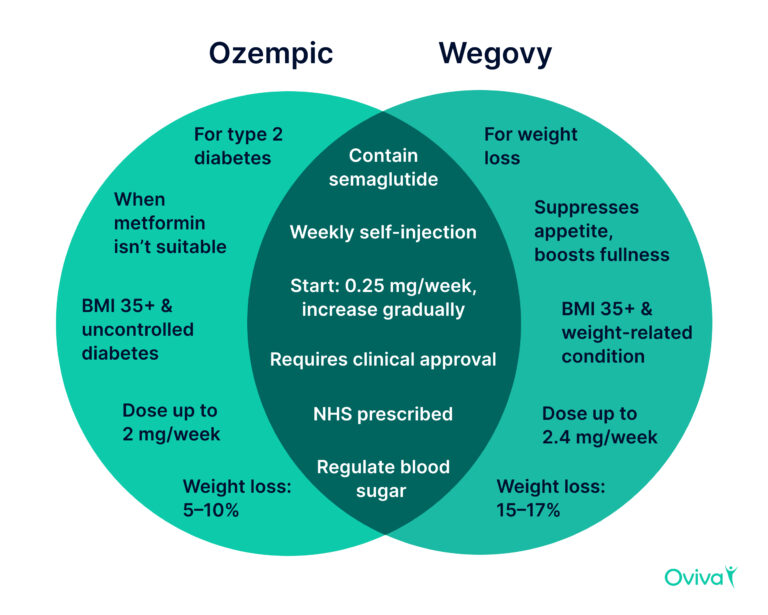
Wegovy vs. Ozempic: what’s the difference?
Wegovy and Ozempic are drugs offering weight loss benefits. Both belong to a category of medications called GLP-1 agonists and contain the same active ingredient: semaglutide.
However, they’re approved for different uses and have different dosage schedules. Of the two, only Wegovy can currently be prescribed via the NHS for weight loss. To receive a prescription for Wegovy weight loss injections via the NHS, you’ll need to be referred to an approved specialist weight management service, like Oviva.
Key Takeaways
- Wegovy and Ozempic are the brand names of the GLP-1 agonist medication semaglutide.
- Semaglutide is a type 2 diabetes and weight loss medication. Within the NHS, it’s distributed as Wegovy for weight loss and Ozempic for type 2 diabetes.
- While they share the same active ingredient, the use and dosage schedules of Wegovy and Ozempic differ.
- If you meet the eligibility criteria, typically a BMI over 35 with relevant comorbidities, you could receive a prescription for Wegovy from the Oviva weight management service.
Is Wegovy the same as Ozempic?
Wegovy and Ozempic are two brand names for a GLP-1 agonist medication called semaglutide. While the two brands share the same active ingredient and are both used for type 2 diabetes and weight loss, they’re functionally different.
Wegovy is specifically prescribed for weight loss. It’s available if you meet the eligibility criteria for referral to a specialist weight management service, like Oviva. The criteria for referral are a BMI over 35 and at least one weight-related health condition like PCOS, type 2 diabetes or high blood pressure.
Ozempic is only currently approved as a type 2 diabetes medication. People taking Ozempic for diabetes may also experience weight loss benefits, but the primary mechanism here is increasing insulin production in the body to manage blood glucose levels.

Both Wegovy and Ozempic are associated with a reduced risk of cardiovascular disease.
You cannot receive an Ozempic prescription on the NHS unless you have type 2 diabetes.
These differences in use are fundamental and affect their dosage schedule. Wegovy and Ozempic cannot be used interchangeably despite having the same active ingredient.
The two medications share the same common side effects, including nausea, vomiting, constipation, diarrhoea and stomach pain. These side effects of Wegovy and Ozempic are typically mild.
The key differences between Wegovy and Ozempic

Wegovy vs. Ozempic table
| Wegovy | Ozempic | |
| Active ingredient | Semaglutide | Semaglutide |
| NHS availability | Prescribed for weight loss | Prescribed for type 2 diabetes |
| Eligibility criteria | BMI over 35
At least one weight-related health condition Referral to a weight management service (e.g., Oviva) |
BMI over 35
Living with type 2 diabetes that’s poorly controlled Metformin deemed an unsuitable treatment option |
| How it’s taken | Self-administered injection, taken once a week | Self-administered injection, taken once a week |
| Dosage schedule | Start at 0.25 mg/week
Gradual increase to maintenance dose of 2.4 mg/week |
Start at 0.25 mg/week
Gradual increase to a max. of 2 mg/week (if a lower dose does not control blood glucose levels) |
| Primary mechanism | Appetite suppression and increased feeling of fullness for weight loss | Increased insulin production to regulate blood glucose levels |
| Avg. weight loss | 15-17% | 5-10% |
Oviva patient success stories:

 -22kg
-22kg
Heidi (53)

 -25kg
-25kg
Martin (34)

 -32kg
-32kg
Patricia (53)
Should I take Wegovy or Ozempic?
Whether you should take Wegovy or Ozempic will depend on the condition that’s being treated.
Wegovy can be prescribed for weight loss if you meet the eligibility criteria. You can then seek a referral to an approved weight management service like Oviva.
Ozempic can be prescribed via the NHS to treat type 2 diabetes. You’ll still need to meet eligibility criteria, including a BMI over 35 and diabetes that’s not currently under control. Ozempic is usually prescribed when other medications are deemed unsuitable for you.
You should discuss the suitability of either Wegovy or Ozempic with your doctor or healthcare professionals.

Can I switch from Wegovy to Ozempic for weight loss?
Wegovy is approved for weight loss, while Ozempic is only approved as a type 2 diabetes medication. Therefore, if weight loss is the primary goal (and you’re eligible), you should be treated with Wegovy, not Ozempic.
If it’s deemed medically necessary, you can switch from Wegovy to Ozempic or vice versa. For example, if you’re living with obesity and type 2 diabetes and you take Ozempic to manage diabetes, it’s possible you could get your blood glucose under control through other methods. This may then mean you could benefit from taking Wegovy for weight loss instead.
The transition between Wegovy and Ozempic is usually relatively simple, as both medications contain semaglutide, though sometimes in different amounts. However, it’s important to reaffirm that the two medications are approved for two different purposes.
Any transition between the two medications will need to be approved by healthcare professionals and the transition will need to be managed carefully. There may also be a requirement to return to the initial dose and gradually build up to the maintenance dose again, even if you reached the maintenance dose of Wegovy or Ozempic previously.
How Oviva can support your weight loss journey
Oviva is an NHS-funded specialist weight management service which provides comprehensive support for your weight loss journey.
Through Oviva, you can access weight loss medication like Wegovy. You’ll also gain access to the Oviva app where you can track your food, mood, and activity, get help meal planning, and receive personalised coaching.
Our multidisciplinary team includes dieticians, clinical psychologists, well-being practitioners, doctors, specialist nurses, and obesity physicians.
Studies show that patients receiving the latest weight loss medication and lifestyle interventions achieve an average of 15% weight loss after one year.
Oviva is available on the NHS. You could benefit from Oviva’s services if you meet the eligibility criteria.
* A lower BMI of over 27.5 is used for people from certain ethnic minority family backgrounds due to research indicating an equivalent risk level at a lower BMI.
** Examples of relevant comorbidities include type 2 diabetes, pre-diabetes, asthma, polycystic ovary syndrome, acid reflux, sleep apnoea, depression, chronic back pain, gallbladder problems, high blood pressure and heart disease.








